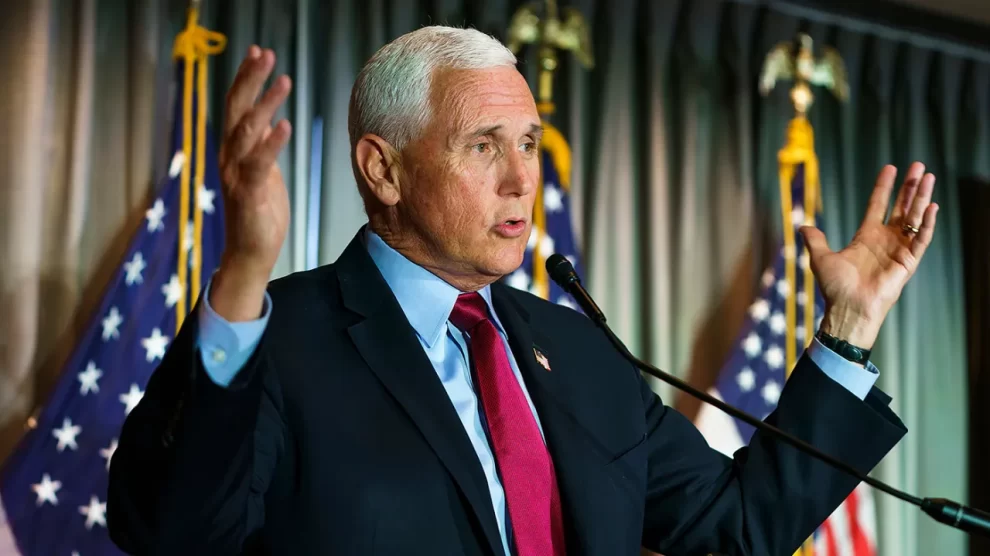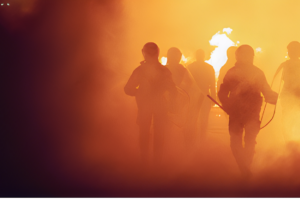Statement: “After China sent a balloon over strategic sites in the United States … President Biden literally sent the secretary of state hat in hand to go kowtow and ask for a meeting.”

Former Vice President Mike Pence said at a conservative conference that President Joe Biden’s stance wasn’t strong enough after a Chinese surveillance balloon entered U.S. airspace earlier this year. Pence, who is running for the Republican Party’s presidential nomination, said he would be tougher against China if elected president.
“I think it is incomprehensible after China sent a balloon over strategic sites in the United States, and their ships cutting off our ships in the South China Sea, and their aircraft cutting off our aircraft in the Asian Pacific that President Biden literally sent the secretary of state hat in hand to go kowtow and ask for a meeting,” Pence said at the Aug. 18 conference in Atlanta with conservative talk radio host Erick Erickson.
Pence said if such a thing happened on his watch, “I wouldn’t have sent my secretary of state. I would have sent an aircraft carrier. And I would have said, ‘You are going to knock this stuff off now, or we will send more until you want to sit down and have a conversation.’”
Pence’s comments could be interpreted to mean that Biden dispatched Secretary of State Antony Blinken to arrange a meeting with China immediately after the balloon was spotted in U.S. airspace. That’s not what happened.
Blinken’s February visit to China was postponed due to balloon
The Pentagon said Feb. 2 that a Chinese surveillance balloon had entered continental U.S. airspace a couple of days before.
Blinken had planned to go to Beijing the night of Feb. 3, but on that day, the State Department said the trip was postponed. That planned meeting stemmed from a meeting between Biden and Chinese President Xi Jinping in Bali in November 2022. The New York Times reported that Blinken’s meeting was meant to keep communication lines open and discuss problematic issues to avoid conflict.
Blinken met Chinese officials in June
Pence’s campaign said he was referring to Blinken’s meeting with Chinese officials in June.
We asked Pence spokesperson Devin O’Malley whether Pence believes that Blinken should not meet with China officials at all, but we did not get a direct answer.
During the June visit, Blinken and Chinese officials discussed a long list of issues including global topics such as the war in Ukraine, human rights violations in China, the flow of drugs and the continuation of the United States’ “One China” policy.
“We are working to put some stability into the relationship, to put a floor under the relationship, to make sure that the competition that we’re in doesn’t veer into conflict,” Blinken told CNN’s Fareed Zakaria after the trip. A conflict, Blinken said, “would not be in our interest, their interest, or anyone else’s.”
Whether it was in America’s best interest to cancel the meeting in February and reschedule for June is a matter of opinion and politics, said Yun Sun, director of the China Program at the Stimson Center, a Washington, D.C.-based foreign affairs think tank.
It was politically untenable for the U.S. to keep the February meeting after the balloon incident, Sun said. But if the U.S. wanted to “maintain the momentum of engagement and improvement of relations since the Bali Summit last November, some level of exchanges, interactions and visits are necessary and inevitable.”
Diplomacy is not a gift to the other side; it’s a necessary means of addressing difficult challenges, said Jessica Chen Weiss, a China and Asia-Pacific Studies professor at Cornell University.
“The postponement of Blinken’s visit was an unfortunate reflection of domestic political pressure, not our best interests,” Weiss said. “The Biden administration’s efforts to reestablish channels of communication is necessary to reduce miscalculation and ensure that efforts to support Taiwan within the context of our long-standing unofficial relationship do not inadvertently provoke the very conflict we are trying to deter.”
It is standard practice for the U.S. secretary of state to visit Beijing, and it would be normal for such visits to alternate with Chinese officials visiting the U.S., said Susan Thornton, a senior fellow at the Paul Tsai China Center at Yale Law School and a retired senior U.S. diplomat.
“The visit of Secretary Blinken to Beijing was long overdue, mostly because of the pandemic,” Thornton said.
Our ruling
Pence said that “after China sent a balloon over strategic sites in the United States … President Biden literally sent the secretary of state hat in hand to go kowtow and ask for a meeting.”
Pence’s remarks create the misleading impression that immediately after the surveillance balloon was spotted, Blinken sought a meeting with officials in China. That’s not what happened.
Blinken’s February meeting with China’s President Xi was planned months before the balloon was noticed. Once the balloon was spotted, that meeting was postponed and the U.S. military shot the balloon down.
Blinken visited China in June, about four months later.
We rate this statement Mostly False.
Source : Austin American-Statment






























